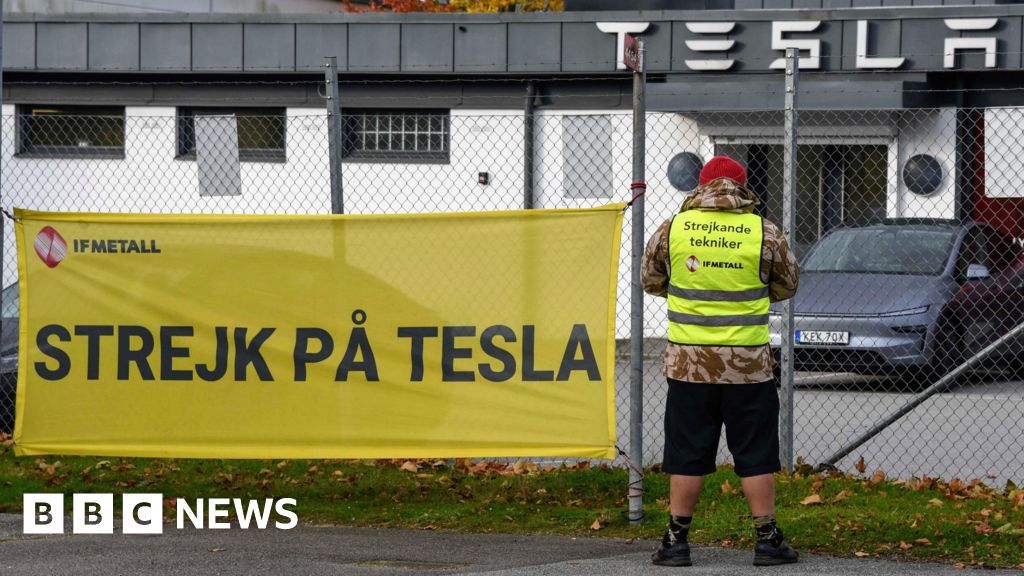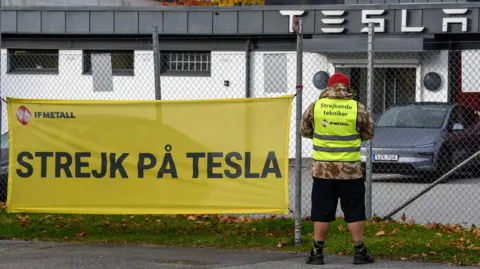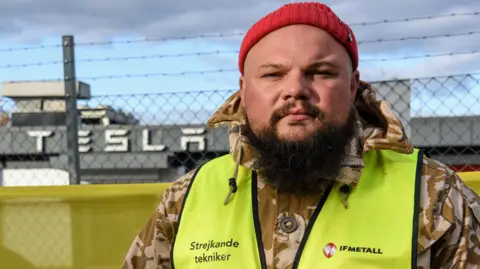Business
The striking Swedish workers taking on carmaker Tesla

Tim ManselBusiness reporter, Malmö, Sweden
 BBC
BBCIn Sweden 70 car mechanics are continuing to take on one of the world’s richest companies – Tesla. The strike at the US carmaker’s 10 Swedish service centres has now reached its second anniversary, and there is little prospect of a resolution.
Janis Kuzma has been on the Tesla picket line since October 2023.
“It’s a tough time,” says the 39-year-old. And as Sweden’s cold winter weather sets in, it’s likely to become tougher.
Janis spends each Monday with a colleague, standing outside a Tesla garage on an industrial park in Malmö. His union, IF Metall, provides accommodation in the form of a mobile builders’ van, as well as coffee and sandwiches.
But it’s business as usual across the road, where the workshop appears to be in full swing.
The strike concerns an issue that goes to the heart of Swedish industrial culture – the right of trade unions to negotiate pay and conditions on behalf of their members. This concept of collective agreement has underpinned industrial relations in Sweden for nearly a century.

Today some 70% of Swedish workers are members of a trade union, and 90% are covered by a collective agreement. Strikes in Sweden are rare.
It’s an arrangement welcomed across the board. “We prefer the right to negotiate freely with the unions and sign collective agreements,” says Mattias Dahl of the Confederation of Swedish Enterprise business organisation.
But Tesla has upset the apple cart. Outspoken chief executive Elon Musk has said he “disagrees” with the idea of unions. “I just don’t like anything which creates a kind of lords and peasants sort of thing,” he told an audience in New York in 2023. “I think the unions try to create negativity in a company.”
Tesla came to Sweden back in 2014, and IF Metall has long wanted to secure a collective agreement with the company.
“But they wouldn’t respond,” says Marie Nilsson, the union’s president. “And we got the impression that they tried to hide away or not discuss this with us.”
She says the union eventually saw no other option than to announce a strike, which started on 27 October, 2023. “Usually it’s enough to make the threat,” says Ms Nilsson. “The company usually signs the agreement.”
But not in this case.

Janis Kuzma, who is originally from Latvia, started working for Tesla in 2021. He claims that pay and conditions were often dependent on the whim of managers.
He recalls a performance review at which he says he was refused an annual pay rise because he was “not reaching Tesla’s goals”. Meanwhile, a colleague was said to have been turned down for a pay rise because he had the “wrong attitude”.
However, not everyone went out on strike. Tesla had some 130 mechanics working at the time the industrial action was called. IF Metall says that today around 70 of its members are on strike.
Tesla has long since replaced these with new workers, for which there is no precedent since the 1930s.
“Tesla has done it [found replacement staff] openly and systematically,” says German Bender, a researcher at Arena Idé, a think tank financed by Swedish trade unions.
“It’s not illegal, which is important to understand. But it goes against all established norms. But Tesla doesn’t care about norms.
“They want to be norm breakers. So if somebody tells them, hey, you are breaking a norm, they see that as a compliment.”
The BBC asked to speak to Tesla’s subsidiary, TM Sweden, but the request was declined in an email citing “all-time high deliveries”.
Indeed, the company has given only one media interview in the two years since the strike began.
In March 2024, TM Sweden’s “country lead”, Jens Stark, told the business paper Dagens Industri that it suited the company better not to have a collective agreement, and instead “to work closely with the team and give them the best possible conditions”.
Mr Stark denied that the decision not to enter a collective agreement was one made at Tesla headquarter in the US. “We have a mandate to make our own such decisions,” he said.
IF Metall is not entirely alone in its fight. The strike has been supported by a number of other unions.
Dockworkers in neighbouring Denmark, Norway and Finland, are refusing to handle Teslas; rubbish is no longer collected from Tesla’s Swedish facilities; and newly built charging stations are not being connected to the grid in the country.
There is one such facility near Stockholm Arlanda Airport, where 20 chargers stand idle. But Tibor Blomhäll, the president of enthusiasts group Tesla Club Sweden, says Tesla owners are unaffected by the strike.
“There’s another charging station 10km (six miles) from here,” he says. “And we can still buy our cars, we can service our cars, we can charge our cars.”
 AFP via Getty Images
AFP via Getty ImagesWith stakes high on both sides, it’s hard to see an end to the stand-off. IF Metall risks setting a precedent if it concedes the principle of collective agreement.
“The concern is that that would spread,” says Mr Bender, “and eventually erode the strong support for the labour market model that we have among employers as well”.
Tesla, on the other hand, may feel that conceding this fight in Sweden would strengthen the hand of those who want to unionise Tesla at its production facilities in the US and Germany, where it employs tens of thousands of staff.
Mr Bender detects another reason for the position Tesla has taken. “I think it’s important to understand that Elon Musk doesn’t want to be sort of told how to do things,” he says.
“And I think he doesn’t view the industrial action that the union has taken as an invitation to negotiate, but rather as an ultimatum to sign a dotted line that he doesn’t want to sign.”
Mr Blomhäll of Tesla Club Sweden also says he sees no quick solution. “This will be another Korean War,” he says. “A conflict that just drags on.”
Business
From Manufacturing To Infra And AI: Capex Boost Flags Off Budget 2026 ‘Reforms Express’

Last Updated:
Budget 2026: FM Nirmala Sitharaman gives a strong push to manufacturing, infrastructure and job creation, while proposing a simpler tax and customs system.

Finance Minister Nirmala Sitharaman presents the Union Budget 2026-27.
Budget 2026 Takeaways: Finance Minister Nirmala Sitharaman on Sunday presented the Union Budget 2026-27, giving a strong push to manufacturing, infrastructure and job creation, proposing a simpler tax and customs regime, and hailing the government’s modernisation drive as a “reforms express”.
The Budget 2026 is anchored around three ‘kartavyas’ — driving growth by enhancing productivity and competitiveness, building people’s capacity, and ensuring inclusive development under the vision of Sabka Saath, Sabka Vikaas.
In her ninth consecutive Budget in Parliament, Sitharaman laid out a multi-pronged strategy to sustain growth amid global uncertainty, including expanding domestic electronics and semiconductor capabilities, de-risking infrastructure projects, skilling India’s youth for emerging technologies, and easing compliance for taxpayers and importers.
Here are the key takeaways from Budget 2026 across manufacturing, infrastructure, skills, AI, taxation and customs duty.
Manufacturing Gets A Boost
Budget 2026 put a special emphasis on the manufacturing landscape in India. The outlay for electronics components manufacturing was raised sharply to Rs 40,000 crore, while new schemes for rare earth magnets, chemical parks, container manufacturing and capital goods seek to reduce import dependency, and strengthen domestic supply chains. Textiles got an integrated, employment-oriented package covering fibres, clusters, skilling and sustainability.
Infrastructure-Led Growth
Infrastructure got a boost with a higher capex allocation and initiatives like a risk guarantee fund to de-risk projects for private developers, new dedicated freight corridors and national waterways, dedicated REITs (real estate investment trusts) for recycling of significant real estate assets of central public sector enterprises (CPSEs), and a seaplane VGF (viability gap funding) scheme.
The Centre’s capital expenditure (capex) target has been increased to Rs 12.2 lakh crore for FY27, up from Rs 11.2 lakh crore earmarked for the current financial year. Moreover, maintaining the fiscal discipline, Sitharaman said the government expects the fiscal deficit to be at 4.3 per cent of the GDP in 2026-27, lower than 4.4 per cent projected for the current financial year.
Tier-II and Tier-III cities were placed at the centre of urban growth via City Economic Regions, backed by reform-linked funding.
“We shall continue to focus on developing infrastructure in cities with over 5 lakh population (Tier II and Tier III), which have expanded to become growth centres,” Sitharaman said in her Budget Speech.
Greater Emphasis On Skilling
The Budget placed renewed emphasis on the services economy as a jobs engine. A high-powered Education-to-Employment and Enterprise Committee will realign skilling with market needs, including the impact of emerging technologies.
Content creation and creative industries get a boost through AVGC labs in schools and colleges, support for animation, gaming and comics, and new institutional capacity for design and hospitality. Tourism-linked skilling, from guides to digital heritage documentation, signals a clear intent to convert culture and content into employment and exports.
“I propose to support the Indian Institute of Creative Technologies, Mumbai in setting up AVGC Content Creator Labs in 15,000 secondary schools and 500 colleges,” FM Sitharaman said. AVGC stands for animation, visual effects, gaming and comics.
AI & Semiconductors Push
Artificial intelligence (AI) was positioned as a cross-sector force multiplier rather than a standalone theme. The Budget provided a push to artificial intelligence (AI) by promoting adoption with governance, agriculture, education and skilling, including proposals for AI-enabled advisory tools for farmers and AI integration in education curricula.
On hardware, the semiconductor strategy expanded decisively under ISM 2.0 (India Semiconductor Mission 2.0), with focus on domestic equipment manufacturing, materials, research centres and workforce development, signalling a long-term commitment to building a resilient chip ecosystem in India.
Taxation, ITR, TDS, TCS
A major structural reform comes with the Income Tax Act, 2025, effective April 1, 2026, containing simpler rules and redesigned forms.
Budget 2026 provided compliance relief for individuals, including extended timelines for revising returns to March 31 from December 31 earlier, staggered ITR due dates, and easier filing of Form 15G/15H through depositories.
Individuals with ITR-1 and ITR-2 returns will continue to file till July 31, and non-audit business cases or trusts are proposed to be allowed time till August 31, according to the Budget Speech 2026-27.
“I propose to extend time available for revising returns from 31st December to up to 31st March with the payment of a nominal fee. I also propose to stagger the timeline for filing of tax returns. Individuals with ITR 1 and ITR 2 returns will continue to file till 31st July and non-audit business cases or trusts are proposed to be allowed time till 31st August,” Sitharaman said.
TDS (Tax deducted at source) rules were clarified for manpower services, while a rule-based system for lower or nil TDS certificates is proposed. TCS rates were cut to 2% for overseas tour packages, education and medical expenses under liberalised remittance scheme (LRS). Litigation is targeted through integrated assessment and penalty orders, lower pre-deposit requirements, and wider immunity provisions.
TDS on the sale of immovable property by a non-resident will be deducted and deposited through resident buyer’s PAN (Permanent Account Number)-based challan instead of requiring TAN (Tax Deduction and Collection Account Number), Sitharaman said.
Customs Duty Tweaks
Customs duty rationalisation continued with a clear focus on domestic manufacturing, energy transition and ease of living. Exemptions have been extended or introduced for capital goods used in lithium-ion batteries, critical minerals processing, nuclear power projects and aircraft manufacturing.
Personal imports will become cheaper with a reduction in duty on goods for personal use from 20% to 10%. Seventeen cancer drugs and additional rare-disease treatments were exempted from customs duty. Process reforms aimed at trust-based, tech-driven clearances, faster cargo movement and lower compliance costs, especially for exporters and MSMEs (micro, small, medium and enterprises).
STT On F&O Hiked
The Budget increased securities transaction tax (STT) on futures trading from 0.02% to 0.05% and on options trading from 0.10% to 0.15%, a move that upset the capital markets with the BSE Sensex crashing more than 2,300 points from the day’s high and the NSE Nifty dropping to 24,571.75.
Securities Transaction Tax (STT) is a direct tax imposed on the buying and selling of securities in India.
Commenting on the Budget, Prime Minister Narendra Modi said, “The Union Budget reflects the aspirations of 140 crore Indians. It strengthens the reform journey and charts a clear roadmap for Viksit Bharat.”
February 01, 2026, 14:43 IST
Read More
Business
Air India resumes direct Shanghai-New Delhi flights after nearly six years

Shanghai (China): The Consulate General of India in Shanghai welcomed the resumption of Air India’s direct flight services between Shanghai and New Delhi, marking a major step forward in restoring people-to-people, business and institutional connectivity between India and China.
According to an official release, the inaugural Shanghai-New Delhi flight departed today from Shanghai Pudong International Airport, carrying over 230 passengers on board the Boeing 787 aircraft. The relaunch comes after a gap of nearly six years and represents a significant milestone in normalising bilateral air connectivity following the suspension of services in early 2020.
Speaking on the occasion, Consul General Pratik Mathur said, “The resumption of direct flights between Shanghai and New Delhi is a tangible expression of the renewed momentum in India-China engagement. Enhanced air connectivity is essential for facilitating trade, tourism, academic exchanges and people-to-people contacts, particularly between India and East China. We are pleased to see Air India restoring this important link.”
As per a release, Air India will operate the route four times a week using its Boeing 787-8 Dreamliner aircraft, featuring modernised cabins and enhanced onboard services. The restored service reflects the growing demand for travel between the two countries and the steady recovery of cross-border mobility. It will also support commercial, educational and cultural exchanges between India and the Yangtze River Delta region, one of China’s most economically dynamic clusters.
The Consulate General of India in Shanghai remains committed to supporting initiatives that strengthen connectivity and deepen cooperation across trade, investment, tourism, education and cultural exchange, the release stated.
Business
‘Holistic And Forward-Looking’: Piyush Goyal Says Budget 2026 Reflects Future-Ready India

Last Updated:
Piyush Goyal termed the Budget “economically and fundamentally very strong”, and stated that it “reflects the aspirations of the youth of the country”.

Minister of Commerce and Industry Piyush Goyal. (File photo)
Union Minister Piyush Goyal on Sunday termed Budget 2026 “futuristic and holistic”, and stated that it “reflects the aspirations of the youth of the country and is forward-looking”.
Speaking exclusively to CNN-News18 on Budget 2026, presented by Finance Minister Nirmala Sitharaman, Goyal said, “This is a fabulous budget and it is very futuristic. The Budget 2026 has covered all sectors including technology, infrastructure, etc.”
“The technology sector has been given a thrust. The budget focuses on infrastructure. It is a holistic and forward-looking budget refecting future ready Bharat,” he said, adding, “The budget meets the aspirations of the youth and new India.”
Stating that the Budget is economically and fundamentally very strong, the Union Minister said, “Farmers, animal husbandry and labour-intensive sectors get a major push as this Budget focuses on investment, value addition and jobs.”
#Exclusive | “The Budget is economically and fundamentally very strong,”Preparing India for Viksit Bharat. Farmers, animal husbandry and labour-intensive sectors get a major push as the Budget focuses on investment, value addition and jobs.@Parikshitl in an exclusive… pic.twitter.com/tJr2SItcaW
— News18 (@CNNnews18) February 1, 2026
‘Budget 2026 Is Human-Centric’: PM Modi
Prime Minister Narendra Modi on Sunday said that the Union Budget 2026 is “human-centric and strengthens India’s foundation with path-breaking reforms.” The Prime Minister also described it as historic and a catalyst for accelerating the country’s reform trajectory and long-term growth.
Following the presentation of the Budget in Parliament, PM Modi said the proposals would energise the economy, empower citizens and give India’s youth fresh opportunities to scale new heights.
“This budget brings the dreams of the present to life and strengthens the foundation of India’s bright future. This budget is a strong foundation for our high-flying aspirations of a developed India by 2047,” he said.
Calling the government’s reform agenda a “Reform Express”, the Prime Minister added, “The reform express that India is riding today will gain new energy and new momentum from this budget.”
February 01, 2026, 19:01 IST
Read More
-

 Sports5 days ago
Sports5 days agoPSL 11: Local players’ category renewals unveiled ahead of auction
-

 Entertainment1 week ago
Entertainment1 week agoThree dead after suicide blast targets peace committee leader’s home in DI Khan
-

 Tech1 week ago
Tech1 week agoThis Mega Snowstorm Will Be a Test for the US Supply Chain
-

 Entertainment5 days ago
Entertainment5 days agoClaire Danes reveals how she reacted to pregnancy at 44
-

 Fashion1 week ago
Fashion1 week agoSpain’s apparel imports up 7.10% in Jan-Oct as sourcing realigns
-

 Tech1 week ago
Tech1 week ago‘Uncanny Valley’: Donald Trump’s Davos Drama, AI Midterms, and ChatGPT’s Last Resort
-

 Tech1 week ago
Tech1 week agoICE Asks Companies About ‘Ad Tech and Big Data’ Tools It Could Use in Investigations
-

 Sports5 days ago
Sports5 days agoCollege football’s top 100 games of the 2025 season






